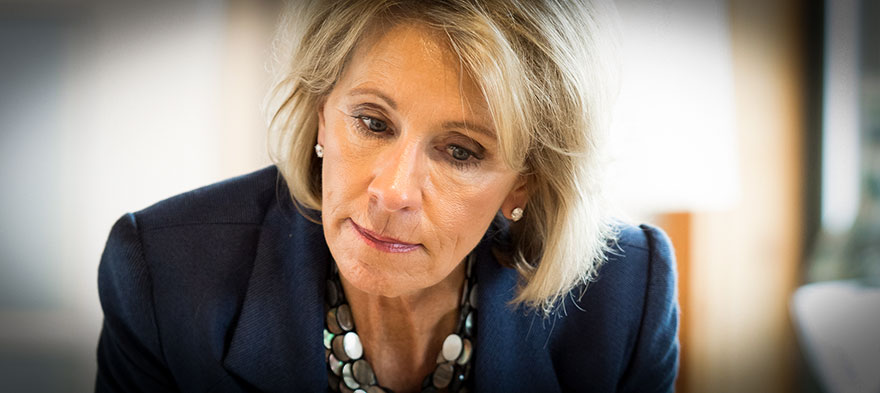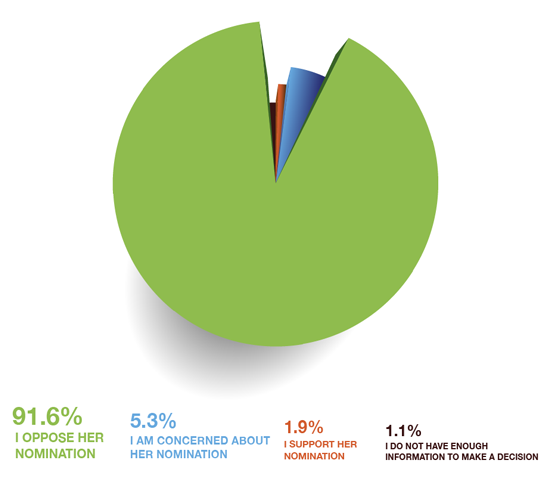
Feb 3, 2017 12:00:00 AM
by Evan Stone
 At E4E, we endorse policies and practices, not politicians, and we stand behind positions that will increase educational equity and excellence for students, lift up communities and elevate the teaching profession. We are committed to locking arms with like-minded advocates in opposition to any measures that threaten our values, principles and beliefs, and to doing so with the full weight and might of our membership of nearly 25,000 public school educators. We are also an organization that believes that a diversity of background, experience and perspective produces stronger solutions, and we are committed to building bridges, not walls. In that vein, we will always be open and willing to have a conversation about how E4E teachers’ ideas, voices and advocacy can join forces with others to build a more just and equitable education system for all students. DeVos was nominated by a divisive, controversial president, whose language has attacked communities and whose actions have spread fear, but if confirmed, she would occupy an office that represents all students and families, including those who did not support her appointment and did not vote for the president. This is why [pullquote position="right"]DeVos must commit to engaging with and listening to her principled critics[/pullquote], including teachers and other stalwarts of equity. The voices of those most concerned about her nomination can help her understand the challenges facing our education system, as well as her responsibility to represent and fight for all students. Our goal in sharing the perspectives of E4E members is to provide a nuanced understanding of our teachers’ opposition to, and specific concerns with, DeVos’ nomination. If confirmed, we strongly encourage her to launch an authentic dialogue with educators and other advocates of equity in our public schools to help ensure that the best interests of students and educators are placed at the forefront of U.S. Department of Education policymaking.
At E4E, we endorse policies and practices, not politicians, and we stand behind positions that will increase educational equity and excellence for students, lift up communities and elevate the teaching profession. We are committed to locking arms with like-minded advocates in opposition to any measures that threaten our values, principles and beliefs, and to doing so with the full weight and might of our membership of nearly 25,000 public school educators. We are also an organization that believes that a diversity of background, experience and perspective produces stronger solutions, and we are committed to building bridges, not walls. In that vein, we will always be open and willing to have a conversation about how E4E teachers’ ideas, voices and advocacy can join forces with others to build a more just and equitable education system for all students. DeVos was nominated by a divisive, controversial president, whose language has attacked communities and whose actions have spread fear, but if confirmed, she would occupy an office that represents all students and families, including those who did not support her appointment and did not vote for the president. This is why [pullquote position="right"]DeVos must commit to engaging with and listening to her principled critics[/pullquote], including teachers and other stalwarts of equity. The voices of those most concerned about her nomination can help her understand the challenges facing our education system, as well as her responsibility to represent and fight for all students. Our goal in sharing the perspectives of E4E members is to provide a nuanced understanding of our teachers’ opposition to, and specific concerns with, DeVos’ nomination. If confirmed, we strongly encourage her to launch an authentic dialogue with educators and other advocates of equity in our public schools to help ensure that the best interests of students and educators are placed at the forefront of U.S. Department of Education policymaking.
Evan Stone is co-founder and co-chief executive officer of Educators for Excellence. Previously, Evan taught sixth grade in the Bronx, New York, while earning his master's degree in teaching from Pace University. While teaching, Evan helped co-found E4E with colleague, Sydney Morris.
Few issues in education spark more tension and debate than standardized testing. Are they a tool for equity or a burden on students? A necessary check on school systems or a flawed measure of...
Charter schools are public schools with a purpose. Operating independently from traditional school districts, they're tuition-free, open to all students, and publicly funded—but with more flexibility...
Despite the benefits of a diverse teaching force, prospective teachers of color fall out of our leaky preparation pipeline at every stage: preparation, hiring, induction, and retention. Here’s what...
Ed Post is the flagship website platform of brightbeam, a 501(c3) network of education activists and influencers demanding a better education and a brighter future for every child.
© 2020-2025 brightbeam. All rights reserved.
Leave a Comment